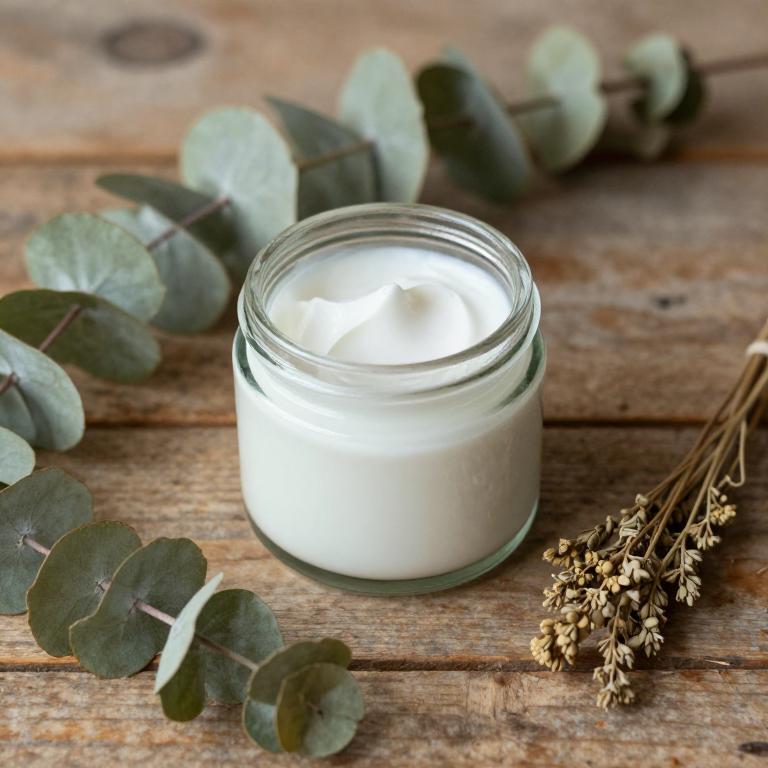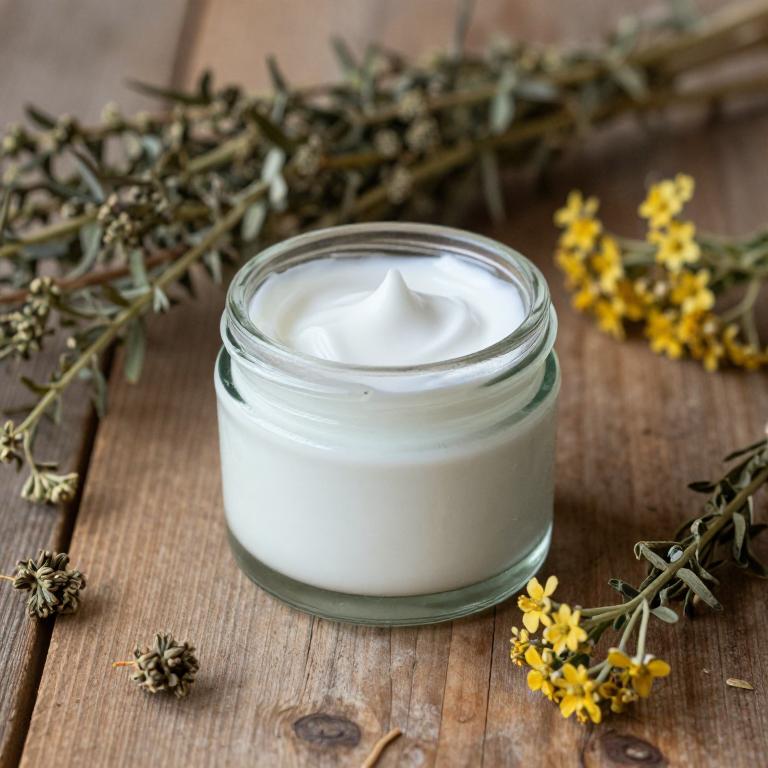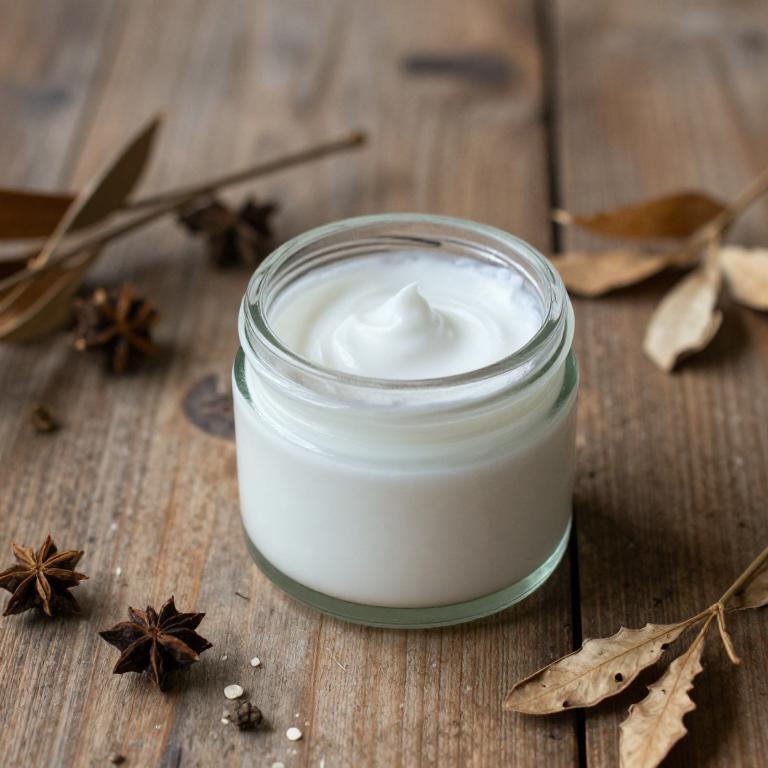10 Best Herbal Creams For Sinusitis

Herbal creams for sinusitis are natural topical treatments that aim to alleviate symptoms such as nasal congestion, facial pain, and inflammation.
These creams often contain ingredients like eucalyptus, menthol, camphor, and turpentine, which are known for their decongestant and anti-inflammatory properties. They work by providing a cooling sensation and helping to open up the nasal passages, thereby improving breathing. While they are generally considered safe for most people, individuals with sensitive skin or allergies should exercise caution.
Herbal creams can be a useful complementary therapy when used alongside other sinusitis treatments, but they should not replace medical advice from a healthcare professional.
Table of Contents
- 1. Eucalyptus (Eucalyptus globulus)
- 2. Ginger (Zingiber officinale)
- 3. Black pepper (Piper nigrum)
- 4. Turmeric (Curcuma longa)
- 5. Rosemary (Rosmarinus officinalis)
- 6. Thyme (Thymus vulgaris)
- 7. Salvia (Salvia officinalis)
- 8. Licorice (Glycyrrhiza glabra)
- 9. Ceylon cinnamon (Cinnamomum zeylanicum)
- 10. Yarrow (Achillea millefolium)
1. Eucalyptus (Eucalyptus globulus)

Eucalyptus globulus, commonly known as eucalyptus oil, is often used in herbal creams for sinusitis due to its anti-inflammatory and decongestant properties.
These creams typically contain a blend of eucalyptus oil with other natural ingredients like menthol, camphor, and lavender oil to enhance their effectiveness. When applied topically, the cream can help reduce nasal congestion and ease the symptoms of sinus pressure and inflammation. The cooling sensation from the menthol and eucalyptus provides temporary relief and a soothing effect on the sinus areas.
While these herbal creams are generally considered safe for topical use, individuals with sensitive skin should perform a patch test before applying them extensively.
2. Ginger (Zingiber officinale)

Zingiber officinale, commonly known as ginger, has been traditionally used for its anti-inflammatory and decongestant properties, making it a popular ingredient in herbal creams for sinusitis.
These creams often combine ginger extract with other natural ingredients like eucalyptus oil or menthol to enhance their soothing and warming effects on the nasal passages. The active compounds in ginger, such as gingerol and shogaol, help reduce mucus production and alleviate nasal congestion, providing relief from sinus pressure and inflammation. When applied topically, these creams can offer a localized treatment that complements other sinusitis therapies, such as nasal irrigation or steam inhalation.
While generally safe for most individuals, it is advisable to consult a healthcare provider before using ginger-based creams, especially for those with sensitive skin or existing medical conditions.
3. Black pepper (Piper nigrum)

Piper nigrum, commonly known as black pepper, has been traditionally used in herbal remedies for its potential anti-inflammatory and decongestant properties.
When incorporated into herbal creams, piper nigrum may help alleviate symptoms of sinusitis by reducing nasal congestion and inflammation in the sinus passages. The active compound, piperine, is believed to enhance circulation and support the body's natural healing processes. These creams are often used as a complementary therapy alongside conventional treatments for chronic or recurrent sinusitis.
However, it is important to consult a healthcare professional before using piper nigrum-based products, especially for individuals with sensitive skin or existing medical conditions.
4. Turmeric (Curcuma longa)

Curcuma longa, commonly known as turmeric, is a natural herb widely used in traditional medicine for its anti-inflammatory and antimicrobial properties.
Herbal creams containing curcuma longa are gaining popularity as a complementary treatment for sinusitis due to their potential to reduce inflammation and alleviate nasal congestion. These creams often include curcumin, the active compound in turmeric, which has been studied for its ability to inhibit inflammatory pathways in the body. When applied topically, curcuma longa creams may help soothe facial pain and pressure associated with sinus inflammation.
However, while they may offer relief, they should not replace prescribed medical treatments for severe or chronic sinusitis.
5. Rosemary (Rosmarinus officinalis)

Rosmarinus officinalis, commonly known as rosemary, is a herb that has been traditionally used for its aromatic and therapeutic properties.
Rosemary essential oil, derived from the leaves of this plant, is often incorporated into herbal creams for its potential anti-inflammatory and antimicrobial benefits. These creams may help alleviate symptoms of sinusitis by reducing nasal congestion and promoting better sinus drainage. The natural compounds in rosemary, such as rosmarinic acid, are believed to support respiratory health and reduce inflammation in the sinus passages.
While herbal creams containing rosemary can be a complementary treatment, they should be used in conjunction with medical advice for effective management of sinusitis.
6. Thyme (Thymus vulgaris)

Thymus vulgaris, also known as thyme, is often used in herbal remedies for its potent anti-inflammatory and antimicrobial properties.
Thymus vulgaris herbal creams are formulated to target nasal congestion and inflammation associated with sinusitis by delivering essential oils like thymol directly to the affected areas. These creams may help reduce mucus production and soothe irritated nasal passages, offering a natural alternative to conventional treatments. However, it is important to consult with a healthcare professional before using these creams, especially if you have sensitive skin or are taking other medications.
While some users report relief from symptoms, scientific evidence supporting their effectiveness for sinusitis remains limited.
7. Salvia (Salvia officinalis)

Salvia officinalis, commonly known as sage, has been traditionally used in herbal medicine for its anti-inflammatory and antimicrobial properties, making it a potential ingredient in herbal creams for sinusitis.
These creams often combine sage extract with other natural components like menthol or eucalyptus to enhance their decongestant effects. When applied topically, the warming and soothing action of sage can help reduce sinus pressure and alleviate pain associated with sinus inflammation. However, while some studies suggest that sage may support respiratory health, more clinical research is needed to confirm its efficacy in treating sinusitis specifically.
As with any herbal remedy, it is important to consult a healthcare professional before using sage-based creams, especially for individuals with allergies or existing medical conditions.
8. Licorice (Glycyrrhiza glabra)

Glycyrrhiza glabra, commonly known as licorice root, is often used in herbal creams for its anti-inflammatory and antimicrobial properties, which can help alleviate symptoms of sinusitis.
These creams typically contain extracts of licorice root, which may reduce nasal congestion and soothe irritated mucous membranes in the sinuses. The active compounds in licorice, such as glycyrrhizin and flavonoids, are believed to have a soothing effect on the respiratory tract. However, excessive use of licorice-based products may lead to side effects like increased blood pressure due to its mild corticosteroid-like effects.
As with any herbal remedy, it is advisable to consult a healthcare professional before using licorice creams for sinusitis to ensure safety and efficacy.
9. Ceylon cinnamon (Cinnamomum zeylanicum)

Cinnamomum zeylanicum, commonly known as cinnamon, is often incorporated into herbal creams for its potential anti-inflammatory and antimicrobial properties.
These creams may help alleviate symptoms of sinusitis by reducing nasal congestion and inflammation in the sinus passages. The essential oils derived from cinnamon are believed to have a warming effect that can help open up the airways and promote better breathing. However, it is important to consult a healthcare professional before using such creams, especially for individuals with sensitive skin or existing health conditions.
While some studies suggest that cinnamon may offer relief for sinus-related discomfort, more research is needed to fully understand its efficacy and safety in treating sinusitis.
10. Yarrow (Achillea millefolium)

Achillea millefolium, commonly known as yarrow, has been traditionally used in herbal medicine for its anti-inflammatory and antiseptic properties.
Herbal creams containing achillea millefolium may offer a natural alternative for individuals suffering from sinusitis by helping to reduce inflammation and mucus production in the nasal passages. These creams are often formulated with other soothing herbs like eucalyptus or chamomile to enhance their effectiveness. While there is limited scientific evidence supporting their use for sinusitis, many users report relief from symptoms such as congestion and facial pain.
It is important to consult with a healthcare professional before using any herbal remedies, especially if you have underlying health conditions or are taking other medications.